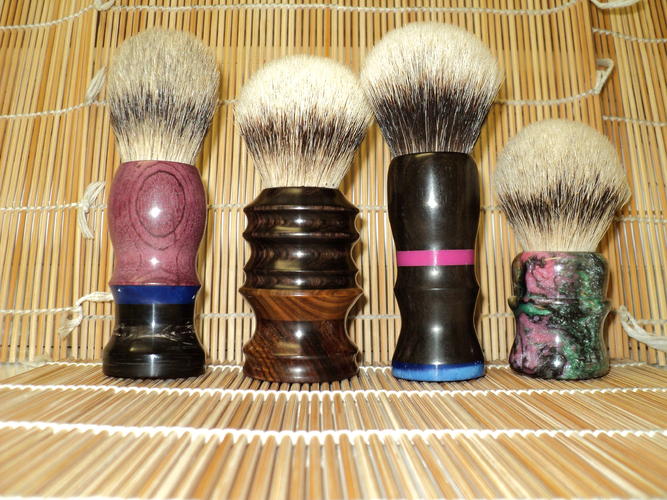Results 1 to 9 of 9
Thread: Flame polsihing acrylic
-
11-08-2013, 03:36 PM #1
 Flame polsihing acrylic
Flame polsihing acrylic
I was browsing a nano-reef forum looking at thier acrylic working tips and tricks and came across a reference to flame polishing a cut edge prior to gluing them together for a tank. Has anyone tried this technique to polish or possibly repair acrylic scales?
The older I get the more I realize how little I actually know.
-
11-08-2013, 04:09 PM #2Senior Member



- Join Date
- Apr 2008
- Location
- Essex, UK
- Posts
- 3,816
Thanked: 3164
I have seen it done - basically it melts the cut edge and gets the frosted look off it and removes the fine saw marks.
In an acrylic work class we made boxes, but used solvent to do much the same thing.
I guess you could join acrylic by treating the edge in this way, but you would still have to solvent-weld the bits together. I think polishing would be more controlled using conventional methods, but it looks an interesting technique.
Regards,
Neil
-
The Following User Says Thank You to Neil Miller For This Useful Post:
MattCB (11-08-2013)
-
11-08-2013, 04:16 PM #3At this point in time...




- Join Date
- Jun 2007
- Location
- North Idaho Redoubt
- Posts
- 27,194
- Blog Entries
- 1
Thanked: 13250
Dan aka Floppyshoes used to be a very active Restorist on here and used some of the Flame polishing techniques, you might search his username in the advanced search function and see what you find..
I do remember talking about it with him in Chat and him saying that it took a bit of practice to get it right, and with the thickness we use for scales, warping was way easier then polishing
-
The Following User Says Thank You to gssixgun For This Useful Post:
MattCB (11-08-2013)
-
11-08-2013, 05:01 PM #4Senior Member


- Join Date
- Jan 2011
- Location
- Roseville,Kali
- Posts
- 10,432
Thanked: 2027
Have done quite a bit of flame polishing in the past.Takes some practice and is normally used for finishing Exposed edges,not edges to be solvent welded.
-
The Following User Says Thank You to pixelfixed For This Useful Post:
MattCB (11-08-2013)
-
11-08-2013, 06:49 PM #5

All of the above^
I was a prototype model maker for many years and the flame polish was often used upon acrylic edges to finish them...but...that had to be done carefully. After a time the clear plastic would often change color to an amber.
NOW, the downside... Areas of flame polish often crazed and cracked or SHATTERED when a solvent like alcohol or some spray cleaners were used to clean them. The cooling of the plastic by evaporation of the cleaner was enough to shrink the outer surface of the plastic and the internal stresses caused by uneven heating overstressed to plastic. Learned the hard way! One 20+hour build clear plastic model was being cleaned for delivery to the client all of a sudden a pile of shrapnel was all that remained. I worked that night and the next and evening day building a new one without sleep to meet the deadline.
Solvent polishing mentioned above was done with a heated bottle of MEK and the plastic surface was fogged with the steam from that bottle. The surface smoothed and dried quickly. Now we know why MEK and Methylene-chloride are banned...we didn't, and I suffer from that lack of knowledge!
We had to oven cure many of our plastic models to stress relieve them. Extruded plastic ( Plexiglas/Perspex) internally stresses quickly from tool heat.
Saying that, I do recommend cast, not extruded, acrylic plastic if you are making scales. And I really strongly suggest you stay away from any polystyrene.
There are many more sources of plastic now that when I started. The blocks of Acrylester are cast, and, I have found that they can be overheated also.
The finer the grit used with power for shaping and polishing plastic the greater the heat transferred during the same time of use to the surface...all things being equal.
That means internal stresses are possible unless great care is taken.
YMMV
~RichardBe yourself; everyone else is already taken.
- Oscar Wilde
-
The Following User Says Thank You to Geezer For This Useful Post:
MattCB (11-08-2013)
-
11-08-2013, 07:23 PM #6Senior Member


- Join Date
- Jan 2011
- Location
- Roseville,Kali
- Posts
- 10,432
Thanked: 2027
Have been turning some Acrylester latley,funny stuff as it has to turned at very high speed > 3000 rpm or it shatters like glass.
-
11-08-2013, 08:04 PM #7

Pixel, did you find that out the hard way?
The older I get the more I realize how little I actually know.
-
11-08-2013, 08:14 PM #8Senior Member


- Join Date
- Jan 2011
- Location
- Roseville,Kali
- Posts
- 10,432
Thanked: 2027
-
11-08-2013, 09:18 PM #9

My condolences, but the brushes look good
 The older I get the more I realize how little I actually know.
The older I get the more I realize how little I actually know.


 6Likes
6Likes
 LinkBack URL
LinkBack URL About LinkBacks
About LinkBacks







 Reply With Quote
Reply With Quote



